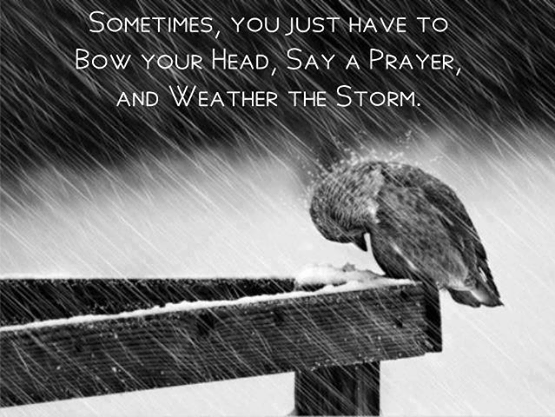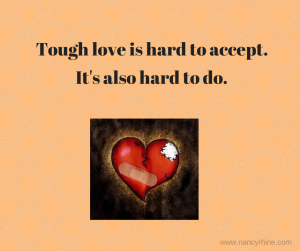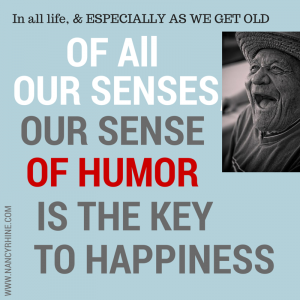The Sageness of the Serenity Prayer
In working with midlife and older age adults and their families for over a decade now, I have come to believe more and more in the eloquence and truth of the Serenity Prayer. I am not an AA member which is how, I think, most of us have heard of this prayer. But I have come to love it. It is written in large letters on a framed poster outside my office. More people have stopped on the way into a therapy session with me to stand before it and read it over and over. It creates an immediate opening for talking about what concerns people bring in to the session. For those of you who don’t know the prayer or don’t remember the words, it goes like this:
God, grant me the serenity to accept the things I cannot change,
The courage to change the things I can,
And the wisdom to know the difference.
In my counseling sessions, we remark on how we can often see a few things we can’t change. We can often see a few things we can change. Those ends of the continuum are fewer and seem more black and white. But it’s that middle section – that wide grey confusing amorphous middle ground, i.e. “the wisdom to know the difference” is often what challenges us the most and forms the basis for many a counseling session.
The photo below is one I found online that many of my people relate to. It speaks to how little we are in control of the elements in our lives, and that “the wisdom to know the difference” may just entail hunkering down, saying a prayer and riding out the storm.
Rethinking “Tough Love”
There’s something we all can understand about how hard it is to be on the receiving end of “tough love”. Everybody acknowledges that. But much less talked about in our society and in psychology circles is how hard it is for people who don’t like conflict to have to hang strong and administer the tough love. It can be excruciating for them. Let’s remember both sides of these relationships.
Radical rest homes: Old people should live everywhere
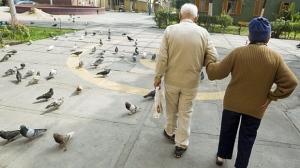 An exciting movement happening amongst our friends in the north country. More creative ideas will be coming forth about how we are going to live as we grow old, I predict. We boomers are just now beginning to face the what-are-we-going-to-do -when-we-get-old awareness. Radical rest homes although, as the article says, may be an oxymoron trenbolone enantato, is a Canadian movement that will be spreading here in America. People getting together in various intentional communities, urban and rural, smaller and larger, multigenerational and just seniors, to share resources, care and hopefully find a more affordable alternative to older style retirement homes which are ok but leave a lot to be desired. Can we improve on them? It will be up to us boomers to start pushing alternative scenarios forward.
An exciting movement happening amongst our friends in the north country. More creative ideas will be coming forth about how we are going to live as we grow old, I predict. We boomers are just now beginning to face the what-are-we-going-to-do -when-we-get-old awareness. Radical rest homes although, as the article says, may be an oxymoron trenbolone enantato, is a Canadian movement that will be spreading here in America. People getting together in various intentional communities, urban and rural, smaller and larger, multigenerational and just seniors, to share resources, care and hopefully find a more affordable alternative to older style retirement homes which are ok but leave a lot to be desired. Can we improve on them? It will be up to us boomers to start pushing alternative scenarios forward.
Read the full article from CBC here:
Radical rest homes: Old people should live everywhere
Hearing Loss VS Dementia In Elderly
 Hearing loss presents often times like dementia: confusion, isolation, depression, defensiveness. – because the person can’t hear! It’s scary and frustrating to not be able to hear well or at all anymore and to feel left out. But too many times, people with hearing loss are quickly given a cursory diagnosis of dementia. Now *that’s* really scary! There is something logically called “Rule Out’s” in medicine and mental health. So, in this case, it is critical to rule out hearing loss before making a dementia diagnosis.
Hearing loss presents often times like dementia: confusion, isolation, depression, defensiveness. – because the person can’t hear! It’s scary and frustrating to not be able to hear well or at all anymore and to feel left out. But too many times, people with hearing loss are quickly given a cursory diagnosis of dementia. Now *that’s* really scary! There is something logically called “Rule Out’s” in medicine and mental health. So, in this case, it is critical to rule out hearing loss before making a dementia diagnosis.
Here’s an excellent article with further thoughts on this very topic:
Dementia or just new batteries needed?
THE KEY TO HAPPINESS IN OLDER LIFE
Report from Marin Death Cafe Sept 10
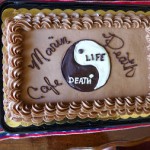 We had a wonderful Marin Death Cafe last evening with 43 participants plus 4 facilitators attending. 9 men and 34 women between the ages of 30 and 92 engaged in deep and authentic conversation over delicious cake and tea.
We had a wonderful Marin Death Cafe last evening with 43 participants plus 4 facilitators attending. 9 men and 34 women between the ages of 30 and 92 engaged in deep and authentic conversation over delicious cake and tea.
Here is some of their feedback submitted on surveys they graciously filled out afterwards:
• I enjoyed hearing the stories in our two groups and gained a bit of insight into others’ experiences
• An important service to the community
• It is refreshing to talk about my feelings about death and life.
• Reassuring, interesting, informative
• Attending did not affect my feelings about death and life but was useful to air out my thoughts
• Communal, interesting, safe
• If someone asked me if they should go to a Death Café I would say “By all means, go!”
• Death Café’s bring my feelings about death and life to the surface.
• Deep, loving, supportive”
• I love hearing people’s stories. We all have thoughts and feelings about life and death
• I liked the “free form”, an organic process as it’s such a rich subject
• Nice to have a venue where people don’t roll their eyes or put their fingers in their ears when I want to discuss death
• Comfortable, innovative, thought-provoking
• If someone told you they were thinking of going to a Death Café, what would you tell them? “Do it!”
• Consider a theme question? E.g. Do you have a bucket list?
• The small group discussion made me feel more comfortable and open
• Thoughtful, sad, safe
• It’s a unique experience but safe and comfortable to talk about life and death
• So nice to have a venue like this – free and public, thank you Nancy and staff. I would like to come again to continue expanding my feelings about death
• My feelings about death were not affected – not enough time – but my thoughts were expanded – more things to think about
• I was perfectly comfortable with strangers
• The structure of small groups after the welcome talk went well. It would have been nice to stay in one group longer. It may not have been necessary to break up at all.
• Nancy did a great job explaining there is no agenda – grass roots movement
• Yummy food – great variety
• Interesting, informative
• Would tell a friend “Absolutely, go”
• Thanks again
• Great idea
• Good conversation – a start
• Maybe a facilitator in each group just to get us going
• Perhaps an outgrowth of the death café is to facilitate “communities” of people to care for each other in sickness and through death
• It gave me a chance to explain my feelings about death and life
• Enlightening, refreshing, thought-provoking
• If someone was thinking about going to a Death Café, what would you tell them? “Do it! It’s well worth the time and effort”
• This was my first Death Café, but it won’t be my last.
• Sharing fears and worries is good
• Stay in same group for the whole time. Can develop intimacy and open up
• It was very good. I was very touched by some of the stories
• If facilitated – just to keep discussion going or encourage people to talk. Good to have 2 group experiences – perhaps 1st one shorter to “warm up” then longer one
• Interesting, promising, thought-provoking
• If someone asked you about going to a death café, what would you say? “Go! It’s not morbid – we all need to open up about this.”
• Would like to have a few more sessions (not indefinite number) to really get into the issues
Marin Death Cafe coming up in 2 Weeks!
Whistlestop Turns 60 and Celebrates with WHISTLESTOCK
Join us at Rancho Nicasio on Sept 28th from 1-7PM for a celebration of Whistlestop’s 60th birthday!
Wonderful rockers will entertain us including Country Joe McDonald, Sopwith Camel, Peter K from the Jefferson Starship, Big Brother and the Holding Company, Ace of Cups and friends, and It’s A Beautiful Day.
This is a fundraiser for Whistlestop as we dramatically increase our services and facility in the next two years, including a 5 story building with 48 affordable senior housing apartments. We give 200,000 rides a year to seniors in Marin and serve hundreds of people through our Meals on Wheels and onsite meal services.
Hope to see you there. For more information click on
Whistlestock .
The Exploding Rate of Depression & Suicide in Older Adults
 The recent suicide of Robin Williams has rightly called our society’s attention to the devastating illness of Major Depression. Major Depression is not just having a bad day or some sad times. Major Depression curls people into a fetal position, makes them feel that they are in another world, one of grayness and severe pain. It does not help these people to cavalierly tell them about your time a month ago when you had a bad day and that they should just “buck up” and get over it. That reminds me of when someone is bereaved, and people thoughtlessly tell them they should just get a puppy and they’ll feel a lot better. What?!!
The recent suicide of Robin Williams has rightly called our society’s attention to the devastating illness of Major Depression. Major Depression is not just having a bad day or some sad times. Major Depression curls people into a fetal position, makes them feel that they are in another world, one of grayness and severe pain. It does not help these people to cavalierly tell them about your time a month ago when you had a bad day and that they should just “buck up” and get over it. That reminds me of when someone is bereaved, and people thoughtlessly tell them they should just get a puppy and they’ll feel a lot better. What?!!
PBS’s “Next Avenue”, one of my favorite websites on growing older, featured an article today on the dramatic increase in suicides amongst the boomer generation, particularly the men. Please read it and be conscious of watching for signs in people you love. Reach out to them, learn about depression yourself and resources in your community, so you can be a help.
